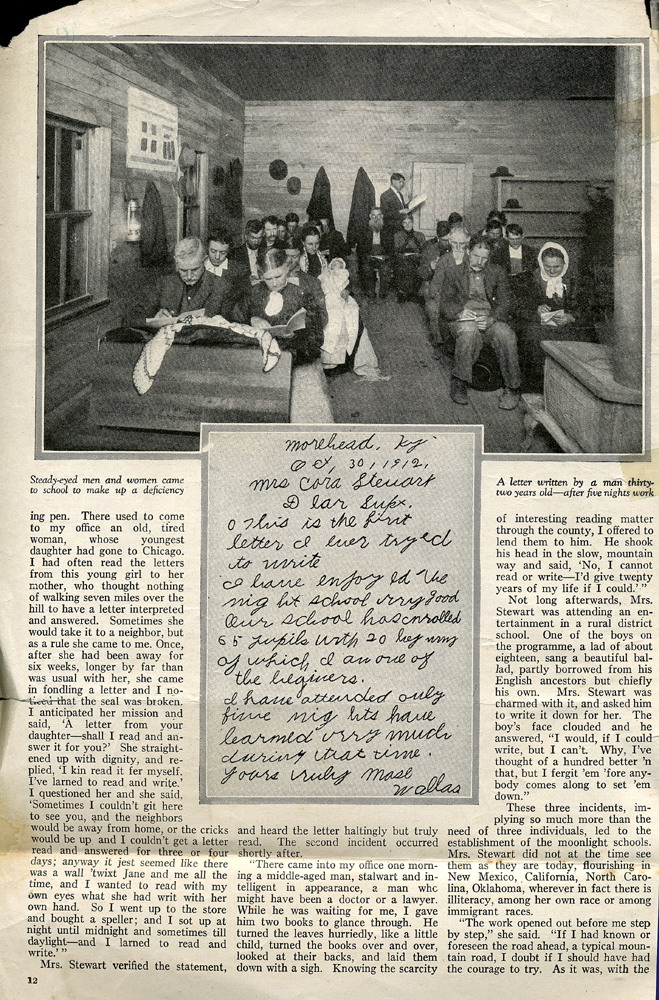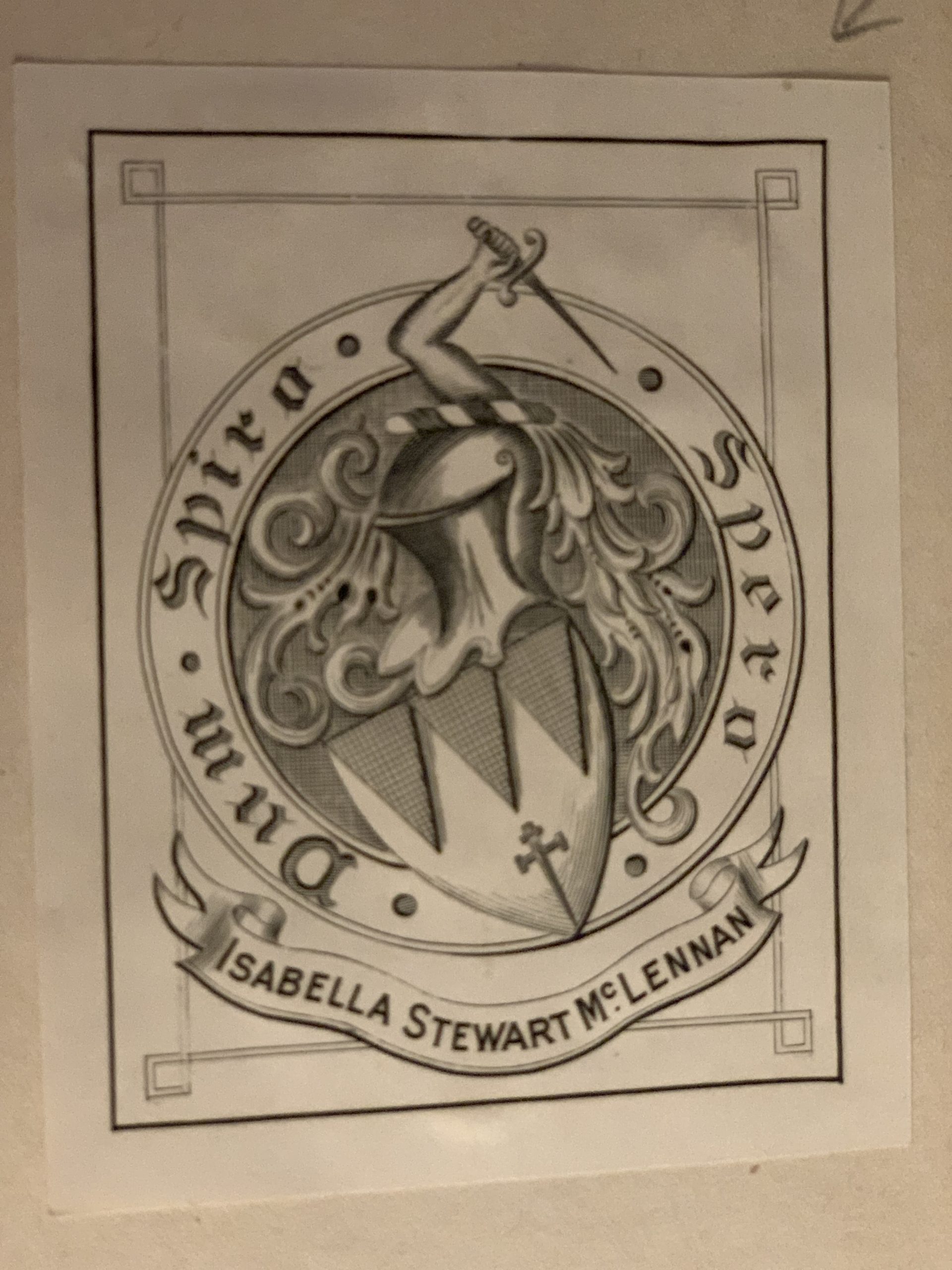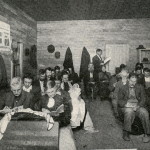Pine Mountain Settlement School
Series 27: SCRAPBOOKS
SCRAPBOOK BEFORE 1929
MOONLIGHT SCHOOLS
“The Moonlight Schools of Kentucky furnish stories of achievement in learning which may give you new ideas of your own possibilities.” [Are You Too Old to Learn? Red Cross Magazine, September 1920]

p.02 “Too Old To Learn …”scr_1929_0054_mod.jpg
TAGS: Cora Wilson Stewart; Hortense Flexner; education ; adult education ; remedial education ; Kentucky ; literacy ; reading ‘ mathematics ; ageism ; farming ; Moonlight Schools ; illiteracy; Isabel [Isabella] McLennan; Marion W. Flexner; Dr. Jeremiah Wilson; Ulysses Grant Carey; Alexander Stewart; Abe Stewart; Kentucky Education Association; Kentucky Illiteracy Council; Jennie Maas Flexner; Carolyn Flexner; Red Cross Magazine;
The following article, while incomplete in the Pine Mountain School’s Scrapbook Before 1929, was published not long after the idea of “Moonlight Schools” caught the attention of educators, administrators, politicians and eventually the nation. The September 1919 issue of the American Red Cross Magazine*, where the first articleon the topic was published, seeks to tie the devestation of WWI to the slow-moving devestation in America’s rural homeland. As the war and its aftermath began to wind down the growing educational wasteland and pockets of poverty in Appalachia began to compete with the war-torn countries of Europe for attention. America turned its attention inward.
Importantly, this article sheds considerable light on the continuing and growing problem of illiteracy in the rural areas of the country prior, during, and after war-time. Also of importance in the evolution of “Moonlight Schools” in eastern Kentucky is the growing independence of women following WWI and the emerging women’s suffrage movement in the United States. It was within this milieu that Cora Wilson Stewart found her road to independence early in the battle for equal rights. But, as she says in the Red Cross article, she found that road to be a rough one.
Cora Wilson Stewart is clearly the innovator behind the “Moonlight Schools” idea that began in eastern Kentucky in Rowan County. The idea for the unique program was not just Cora’s idea alone, but was fed by the many streams of social injustice that affected women and children. Kentucky was unique among the states in recognizing the deficits in education and Moonlight Schools joined many firsts in education in the state of Kentucky. It was a state in which educational opportunity required remarkable persistence and resilience particularly in rural populations. Often poor rural families were belittled for their ignorance and poverty and rarely credited for their abilities. It was not difficult to find women swiftly coming to the assistance of this population as their own ignorance and lack of upward mobility was severly curtailed. The rights of women to chart their destiny and the right of all individuals to an education regardless of age, sex and wealth begged for organized movements for social justice. Further, education was one of the few occupations open to women at this time. Women such as Cora Wilson Stewart and the early teachers at Pine Mountain Settlement School and other settlement and mission school teachers and workers in Appalachia, played a major role in the early evolution of Kentucky education as well as women’s rights. The “Moonlight Schools” are testimony to the extraordinary skills and abilities of motivated teachers and students when faced with the mounting governmental insensitivity to knowledge for all.
One of the greatest obstacles to education was the competition of subsistence farming. Farms had to be maintained and maintenance was demanding and limited by daylight. First established in 1911 by Cora Wilson Stewart in Rowan County in eastern Kentucky “Moonlight Schools” quickly caught on for Cora recognized that education could not often compete with the need to plant and to harvest. “Free time” was rarely “free”. Yet, when the sun was gone and night was across the land, educational centers could capture some of the children for extra attention. As adults joined many of the children, the illiteracy of both children and adults became obvious.
Cora Wilson was an eager and innovative teacher who was born in Rowan County in 1875. As the daughter of Dr. Jeremiah Wilson she received a solid education and aimed for teaching. It was one of the few occupations possible for women in her rural environment. She was hired to work in one of the many one-room schools in the mountains of eastern Kentucky in her home county of Rowan. Her early life was unsettled and demonstrably guided by a strong will. As a young adult she first married Ulysses Grant Carey but the marriage did not last and her divorce after two years showed a strong streak of independence in a culture that did not look kindly on divorce. Not long after this first divorce she was again married and this time to Alexander Stewart, whose name she kept but not until she had divorced him twice! The first divorce of Stewart was in 1904 but was short-lived. She remarried him just three months later. She took up the busy life of wife, mother, and teacher. She taught for several years but soon showed signs of restlessness. While restless, she was obviously very persuasive and socially skilled and soon advanced into the demanding job of Superintendent of Schools in Rowan County — the first woman in the county to hold the position.
In 1910 Cora Wilson Stewart again divorced her husband Alexander Stewart, and this time she stayed divorced. The couple’s only child, born in 1907 had died in the first year of life and by 1908 Cora was again lookig outward. The death of her child likely led to the couple’s final divorce in 1910. Soon, however, Cora was again immersed in her work. She was recognized and appointmented by the Governor of Kentucky to the Kentucky Illiteracy Council in 1914 and that was followed with her election by her peers as the first woman to serve as the President of the Kentucky Education Association.
By any measure, Cora Wilson Stewart had high ambitions and a demanding jobs. Her appointment to the Illiteracy Council had followed her deep work with illiteracy in her small community and her work as Superintendent. While working closely with her community in the classroom and later as Principal and Superintendent, Cora personally observed the importance of promotingt literacy in the family as well as in the children. Her creative and pragmatic approach to addressing illiteracy led to the creation of the “Moonlight School” a pragmatic means to get adults into the classroom in the evening hours when farming and other occupations generally ceased. Her call for adults to learn to read and perform basic math soon produced a flood of education seekers. The numbers overwhelmed the classrooms and the results exceeded even her own high expectations. She was soon led down that difficult mountain education road to a success that even she did not predict. The reading literacy model she established in her Moonlight School quickly demonstrated results and her innovation was soon used by other school and school systems to address underserved populations throughout the state and eventually across the country.
The information regarding Cora’s life was taken from the following: Williams, Virginia, “Cora Wilson Stewart and Development of the Moonlight School” (1978). Moonlight Schools Collection. 75. https://scholarworks.moreheadstate.edu/moonlight_schools_collection/75
To see a full discussion of Cora Wilson Stewart’s life and work, see the extensive collection of material held in the Camden-Carroll Library at Morhead State University in Rowen County where the university has proudly assembled a comprehensive body of work about Stewart and about her innovative “Moonlight School.”
The following article fragment found in the Pine Mountain Settlement School Scrapbook collections was of keen interest to the Pine Mountain valley community as it outlined a program that already familiar to both Katherine Pettit and to Ethel de Long Zande, the School’s principal. Stewart’s rationale and her graphically described program would have resonated well with the early development of the settlement school and with Pettit’s ideas of country life.
“Too Old to Learn,” by Hortense Flexner (1885-1973) was inspired by the Country Life Readers, edited by Stewart for her Moonlight Schools. The Readers appear to have been a favorite of Katherine Pettit, at Pine Mountain Settlement who followed the Country Life Movement, a Progressive era movement that had an agrarian base and grew out of the reforms in rural life sought by President Theodore Roossevelt. It was Roosevelt who created the Commission on Country Life in 1908 he appointed some of the most progressive environmentalists in the country. For example, Liberty Hyde Bailey, a horticulturalist and Gifford Pinchot, forester for the Vanderbilt Biltmore Estate, Kenyon L. Butterfield, an agricultural scientist as well as a sociologist who created the Cooperative Agricultural Extension programs that were often run from the country’s universities. All these programs had an agricultural base; all were important to the educational ideals of the Progressive movement. There are many other instances that link both Pettit and Ethel de Long Zande with this Progressive rural reform movement.
Of further interest to Pine Mountain School’s history, Hortense Flexner, author of the article from the PMSS scrapbook was from Louisville and clearly knew an early Pine Mountain worker, Isabella Stewart McLennan [McMeekin] also from Louisville. McMeeken taught at Pine Mountain in the very early years and following her departure from the School became a well-known writer in Kentucky. She authored books on the Blue Grass region, books about horses, and a well-received history of Louisville. It is not known how the two came to know each other, but a fragment of their friendship may be found in a small book of poems by Hortense Flexner. Titled, Clouds and Cobblestones, and published in 1920. The author of this essay located a copy of the early book of poems and when the book was opened, the inner board of the book contained a note from Hortense Flexner to “Miss McLennan.” The note reads

“Dear Miss Mclennan,
Thanks so much for the friendly review written the nice man in Chicago. He hasn’t exactly read ‘my past’, but he had read my book. So I shall never complain. It was awfully good of you to send it.”
Sincerely,
Hortense Flexner King
Just how the two became acquainted needs further research, but the connection must certainly be found in the collaborative work that Isabel McLennan McMeekin did with Marion W. Flexner (1899-1992) a well-known author of culinary publications and gardening books. Marion W. Flexner was a graduate of Wellsley College and her writing suggests a deep familiarity with the Country Life Movement. . Her relation to Hortense Flexner is not known. See Isabel [Isabella] McLennan‘s biography among the Pine Mountain Settlement School biographies.

Bookplate from Isabella McLennan’s copy of “Clouds and Cobblestones” by Hortense Flexner.
Literature from the Country Life Movement shows up frequently in the archive at Pine Mountain and in many brochures, articles (such as the one below) and books. There are many books in the archive with Katherine Pettit’s name associated with them. (See Katherine Pettit Book Collection) While not yet determined, it is very likely that Katherine Pettit and Cora Wilson Stewart knew one another through their in-common friends..
Roosevelt’s Commission on Country Life aimed for three objectives in its program to improve rural life. First among these was a national agricultural extension program and next a scientific survey of rural life. To accomplish these objectives, the third building block was the creation of a national agency that would address the problems of the country’s rural areas. It was the Smith-Lever Act of 1914, just one year after the founding of Pine Mountain Settlement by Katherine Pettit, that put forward the three objectives for the improvement of rural life. The combination of the national agricultural extension program, the scientific surveys of rural life, and the establishment of a national agency devoted to rural progress which was known as the American Country Life Association, founded in 1919 was the force behind both Cora Wilson Stewart and Moonlight Schools and Katherine Pettit and Pine Mountain Settlement.
It is not surprising to find Hortense Flexner [King], the author of “Are You Too Old to Learn …” attracted to the story of Stewart’s Moonlight Schools. Like Cora Wilson Stewart, Flexner was a Progressive and a Suffragist. She was also, a newspaper writer and a poet and keenly interested in literacy. She had received a rich education at Bryn Mawr College and later graduated from the University of Michigan, with a B.A. in 1907, and a M.A. in 1910. She seemed to know early-on that women’s rights needed to be fought head-on but she clearly benefited in that fight from her privileged upbringing.
Following her graduation, Hortense Flexner secured a job with the Louisville Herald while spending her volunteer hours with her sisters Jennie Maas Flexner and Carolyn Flexner to get out the vote for the right of women to participate in the Louisville school board elections in 1912, a prelude to their activity to win the right to vote in the general election. As a friend of Pine Mountain worker and Louisvillian Isabella Stewart McLennan [McMeekin] , a Wellsley graduate, Hortense Flexner surely shared additional contacts with Pine Mountain which was closely aligned with the Louisville settlement house. Flexner’s early collection of poetry, Clouds and Cobblestones (1920), dives deeply into her inner-self and into the essence of the time in which the Moonlight Schools evolved and provides and intimate journey into the lives of women in this era.
The following fragment of the Hortense Flexner article is in the process of transcription with the missing segments transcribed from online The Red Cross Magazine.
Click on the panels to enlarge.
- p. 01 “Too Old To Learn …” scr_1929_0053_mod.jpg
- p.02 “Too Old To Learn …”scr_1929_0054_mod.jpg
- p.03 “Too Old To Learn …” scr_1929_0054a_mod.jpg
- p.04 “Too Old To Learn …” scr_1929_0055_mod.jpg
- p.05 “Too Old To Learn …” scr_1929_0055a_mod.jpg
- p.06 “Too Old To Learn …” scr_1929_0056_mod.jpg
- p.07 “Too Old To Learn …” scr_1929_0057_mod.jpg
TRANSCRIPTION (pending)
GO BACK TO:
SCRAPBOOK BEFORE 1929
SEE ALSO:
ISABEL [ISABELLA] STEWART McLENNAN McMEEKIN








